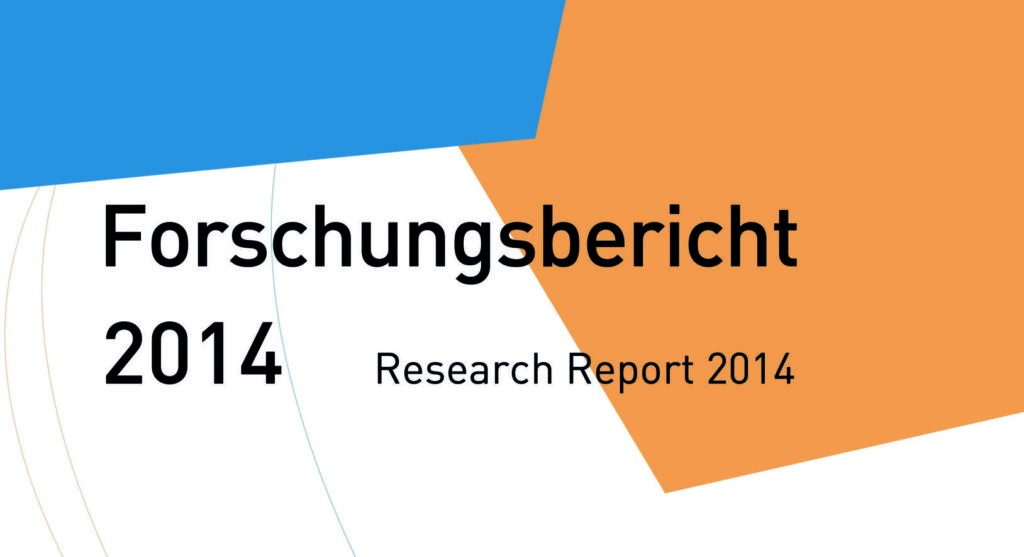
ZeMKI Research Report 2014
Editorial
For media and communications researchers, 2014 was a special year. The Federal Ministry of Education and Research (BMBF) dedicated the Year of Science under the motto „The digital society“ (http://www.digital-ist.de); this has always been a core theme of the research at the ZeMKI, and so its members were engaged broadly in various ways in the Year of Science. Thus, ZeMKI‘s Creative Unit „Communicative Figurations“, which is funded by the Excellence Initiative, contributed an interactive multimedia table to the traveling exhibition of the BMBF for the Year of Science. For the construction of the exhibit table, the ZeMKI collaborated with the Institute for Information Management Bremen (ifib). The exhibition was shown on the ship MS Wissenschaft“ („MS Science“), which berthed in Bremen and in many other research locations along German rivers. The DFG funded priority programme „Mediatized worlds“ took the opportunity to present three of its projects of the Year of Science motto in the official flyer and website „Terra Digitalis“ of the German Research Foundation (http://www.terra-digitalis.dfg.de). Various ZeMKI researchers held lectures at a number of events during the Year of Science. Eventually, the ZeMKI took the lead in an exhibition on the „Digital Society“ in the Haus der Wissenschaft („House of Science“) in Bremen. In this respect, 2014 gave us the opportunity to present the diverse and rich research acitivities in an attractive manner to the general public.
In addition to these activities, 2014 was a year of restructuring and expansion for the ZeMKI: After we moved into a second wing of the ZeMKI building in Linzer Street, a wall between the old and the new wing of the house had to be opened. Owing to the extension, the ZeMKI obtained much needed new office space, a larger meeting room (that will be equipped with fresh seating and a new digital projector and sound system) and a perception laboratory for the ZeMKI Lab „Networked Communications“ by Thomas Friemel. The new studio now houses experiments on media perception. As part of the renovation, the ZeMKI finally also got an LED sign (so that guests can find the building more easily). Furthermore, the statutes of the ZeMKI were amended in order to introduce a steering committee, which began its work in 2014.
Another feature of the last year in the field of internationalization was a guest professorship by Tristan Mattelart of Universitè Paris 8. He deputized for Friedrich Krotz, who took a research semester within the context of the priority programme „Mediatized Worlds“. Tristan Mattelart has greatly enriched not only the teaching of the communication and media studies programmes through his international perspective, but also contributed greatly to stimulating conversations on the local research culture. In the winter semester of 2014, Christine Lohmeier came to the ZeMKI from the University of Munich to deputize in a currently vacant professorship of Communication and Media Studies with a focus on Comparative Cultural Analysis after Tanja Thomas had left the ZeMKI for the University of Tübingen.
By the end of 2014, it was finally possible to extend the target agreement for the ZeMKI with the State of Bremen for another 5 years. This is another important milestone that was only possible through the commitment of all researchers at the ZeMKI, and the participation in the high-profile area „Information, Cognition, Communication“ of the University of Bremen and its subsequent development into „Minds, Media, Machines“ in the context of the Excellence Initiative. This will provide a solid basis for ZeMKI research endeavours for years to come.
Against the background of such fundamental changes, we must not forget the many other successes: The Priority Programme „Mediatized Worlds“ was successfully extended for the third and final funding phase. The Collaborative Research Center 597 „Transformations of the State“ – a sub-project of which the ZeMKI was involved – ended its final phase very successfully. Various other individual projects could be raised and others were completed. Qualification projects have been successfully developed further, and with Johanna Möller‘s dissertation one doctoral project was finalized. In addition, a total of 14 monographs and edited volumes were published by ZeMKI members together with a vast number of articles in partially very prestigious journals and presentations at major national and international conferences. The cooperation of study programmes in the fields of communication and media studies and digital media with the media industry were brought forward. And very successful projects of research-based learning have been implemented, for example a Repair Café that was organized by Sigrid Kannengießer and had a very broad public impact. A doctoral junior research network has been established, a postdoctoral network and the international ECREA Summer School were successfully realized for another year – and much more. This research report is meant to provide an insight into our research work, but can only show a small portion of the full range of activities.
In this sense, we are left to hope that it will go on like this in 2015, not at least because this year will mark the tenth anniversary of the ZeMKI. A bit of the colour that has been introduced by the ZeMKI in media and communication studies at the University of Bremen, may already be apperent in this research report. That is why we have decided to print it in full colour for the first time.
The ZeMKI Research Report 2014 is available here.


